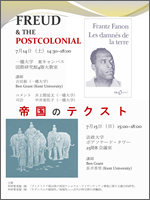
"Freud and the Postcolonial" (Symposium)
ケント大学のベン・グラント氏をお招きして、シンポジウムを開催します。多くの皆様のご来場をお待 ちしています。
ちしています。
主催:科研費基盤(B)プロジェクト「ヴィクトリア朝以降の英国ナショナル・アイデンティティ構築に関する融合的研究」(研究代表者:丹治愛)、 科研費基盤(B)プロジェクト「モダニズムの越境性/地域性――近代の時空間の再検討」(研究代表者:中井亜佐子)
日時:2012年7月14日(土) 14:30〜18:00
場所:一橋大学 東キャンパス国際研究館4階 大教室 (アクセス)
講師:吉田裕(一橋大学) ベン・グラント(ケント大学)
コメント:井上間従文(一橋大学)
司会:中井亜佐子(一橋大学)
使用言語:英語
【 発 表 要 旨 】
Yutaka Yoshida
Moses and the Archaeology of Resistance: Ngũgĩ wa Thiong's A Grain of Wheat contra Freud's Moses and Monotheism
This presentation examines the transplantation of the figure of Moses by reading Ngũgĩ wa Thiong's A Grain of Wheat (1967) alongside Freud's Moses and Monotheism (1938). I propose that their idiosyncratic uses of Moses have two linkages despite their historical, political, and textual differences. Firstly, both texts follow but problematize the way of seeing psychoanalysis and anthropology mutually constitutive, a discourse that as Michel Foucault implies in The Order of Things is instrumental in sustaining colonialism in terms of knowledge and science. Ngũgĩ's fiction critically inherits Jomo Kenyatta's anthropological study on the Gikuyu people, Facing Mount Kenya, and Freud's Moses departs from his Totem and Taboo that drew much from the Victorian anthropology. Secondly, their critical attitudes on each preceding texts let them situate at the heart of collectivities the biblical figure and displace the origin of his birth. Both texts thereby reject consolidating ethnic identities in the era of nation-building. Ngũgĩ constellates biblical narratives with those involved, or uninvolved, in the 'Mau Mau.' Likewise, Freud's major argument in the book – "Moses was an Egyptian" – endorses neither the purity of Jewishness in face of Anti-Semitism, nor the founding moment of the Israel state in Palestine. I argue therefore that A Grain of Wheat and Moses and Monotheism register the possibility and impossibility of inheriting a discontinuous memory of collective resistance.
Ben Grant
'Inhuman Voices' : Reflections on the Place of Ancestors in the Work of Frantz Fanon
At first sight, Fanon seems entirely to reject the idea that ancestors have a determining effect on individual and collective identities. This is particularly obvious in the conclusion of Black Skin, White Masks, where he describes ancestral voices as 'inhuman'. However, this article will argue that Fanon's discussion of the ancestral should be read as part of his wider analysis of the colonial world, where the colonizer plays the role of ancestor. In The Wretched of the Earth, which I characterize as a rewriting of Freud's myth of the origin of man, Fanon seeks to avoid reproducing this colonizing ancestor in the new, postcolonial nation. In the process, he offers us a description of the ancestral which is radically different from that of Freud, and of the colonizer. It is therefore on the basis of a reconceptualization, rather than a straightforward rejection, of the figure of the ancestor that Fanon aims to found a new kind of community, and a 'new man'. This has important and wide ranging implications for how we think about genealogy, origination and creativity, the nation state, psychology, and our relationship to the past and to tradition.
|